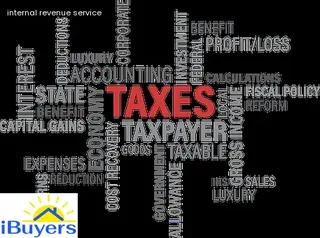Yes, it is possible to avoid paying capital gains tax on property when selling real estate. As a real estate seller, you will want to be aware of some tips and strategies to help you keep more of the proceeds from your home sale.
One way to reduce or eliminate capital gains tax is to take advantage of the exclusion rules. For example, if you have resided in the same home for at least two years, you may be able qualify for a $250,000 exemption if you are single and a $500,000 exemption if you are married.
Additionally, you can defer taxes by rolling over profits from your home sale into another qualified property within certain time periods. There are other options as well such as investing in a 1031 exchange or gifting the property that could potentially result in reducing or eliminating capital gains tax when selling real estate.

When it comes to selling real estate, minimizing the tax liability associated with capital gains can be a significant challenge. However, by making smart decisions and taking advantage of some of the strategies available, sellers can reduce their capital gains tax liabilities while increasing their overall profits.
One strategy is to maximize deductions around the time of sale. Taking deductions for any home improvements made during ownership as well as commissions and other fees associated with the sale can reduce taxable income.
Additionally, if you have owned the property for more than one year, you may qualify for long-term capital gains rates which are typically lower than short-term rates. You may also want to consider exchanging properties instead of selling them directly for cash.
This type of exchange allows sellers to defer taxes on the gain until a later date or in some cases altogether. Finally, if you own multiple properties, spreading out sales over multiple years can help minimize your overall tax burden since each sale will be taxed separately from all others in that given year.
By understanding these strategies and implementing them correctly, sellers can effectively reduce their real estate tax liabilities while still achieving their financial goals.
When it comes to selling property, one of the most important things to understand is capital gains taxes. Capital gains taxes are taxes imposed on the profit made from a sale of real estate or other assets and can be quite substantial.
Fortunately, there are some strategies that can be employed to help sellers avoid paying capital gains tax when they sell their property. For starters, if you own the property for more than 12 months and it's your primary residence, you may be able to claim an exclusion of up to $250,000 in capital gains (or $500,000 if you're married).
Additionally, if you reinvest the proceeds from the sale into another residential property within two years of the sale, you may qualify for a so-called 1031 exchange which allows for deferment of capital gain taxes until a later date (but not forever). Lastly, making improvements to a property before selling it can potentially reduce or even eliminate any profit made on the sale.
By understanding these strategies and taking advantage of them when applicable, real estate sellers can help avoid costly capital gains tax payments.

When selling a property, understanding capital gains tax exclusions is important for real estate sellers. There are certain situations where the capital gains tax does not need to be paid and can be excluded from the sale.
This could include selling a primary residence and using the proceeds to buy another home of equal or greater value, or selling a home that has been owned for at least two out of five years and meeting other specific criteria. Other considerations include not exceeding the exclusion limit, which is typically $250,000 for individuals and $500,000 for married couples filing jointly.
It’s also important to consider any state taxes that may be applicable on top of federal taxes, as well as any other deductions or credits that may be available under the law. Knowing your options when it comes to avoiding capital gains tax on property sales can help save a significant amount of money in the long run.
Passive income is income that requires minimal effort to generate, and typically doesn't require any active participation. It can include dividends, rental income, royalties, interest payments and capital gains from sale of assets such as real estate.
When selling property, one of the best ways to reduce your tax burden is to take advantage of passive income opportunities. You can use these strategies to defer or avoid paying capital gains taxes on the sale of a property: set up an installment sale agreement with the buyer, exchange the property for another investment, or reinvest the proceeds in a 1031 exchange.
With proper planning and execution, you can minimize your capital gains liability by utilizing passive income streams.

Real estate investing can be a great way to build wealth and generate income. Investing in property can offer significant tax benefits with many investors taking advantage of deductions, exemptions and other incentives to reduce their capital gains taxes when selling.
While investing in real estate has some inherent risks, it can be an incredibly profitable endeavor if done correctly. Before you invest in property, make sure you understand the local laws and regulations as well as any tax implications that could affect your investment.
Researching different types of investments can help you determine which option is best for your financial goals. Additionally, enlisting the help of a professional accountant or tax advisor may prove beneficial when making decisions about how to maximize your returns on investments while minimizing your exposure to capital gains taxes.
When selling a home, it is important to understand how capital gains taxes can affect the overall sale price. Capital gains taxes are the taxes that must be paid when property is sold at a profit.
For example, if you purchased a home for $200,000 and sold it for $300,000, then you would have made a $100,000 profit and would have to pay capital gains tax on that amount. Depending on your income level and other factors such as whether you lived in the house for two years or more prior to selling, the amount of capital gains tax due may vary.
It is important to consult with an accountant or financial advisor when determining the amount of capital gains tax that could be due after selling a property so that proper measures can be taken in order to avoid paying them.

When selling a second home, it is important to be aware of the potential tax implications. Capital gains tax may apply if the property has increased in value since the time of purchase.
Depending on individual circumstances, there may be ways to reduce or even avoid capital gains tax when selling a second home. One option is to calculate whether the cost of improvements made to the property exceeds any increase in value.
In some cases, this can result in no tax being due at all. Additionally, some homeowners may qualify for an exclusion on capital gains taxes if they have lived in the property as their primary residence for two out of the five years prior to selling it.
Owners should also consider other strategies such as exchanging real estate for another kind of investment or deferring payment until a later date by using a 1031 exchange. It is important to consult with an experienced financial advisor before deciding which method best suits one's needs and financial situation.
When selling a house, one of the most important considerations is how to minimize potential losses on the sale. Unfortunately, if the sale price of a home is lower than it was purchased for, the seller may be subject to capital gains taxes.
Capital gains taxes are calculated based on the difference between what was paid for the property and what was received in return. To avoid losing money when selling a home and potentially having to pay capital gains taxes, real estate sellers should consider various approaches such as making improvements before listing, researching comparable homes in their area, and setting an attractive asking price.
Additionally, understanding capital gains tax liability on home sales can help sellers make informed decisions about whether or not they should proceed with a sale at all.

When selling real estate, it is important for sellers to be aware of the IRS requirements for reporting profits from home sales. To avoid capital gains tax on property, sellers must report all profits from the sale on their federal taxes.
Depending on the amount of gain, it may be necessary to fill out a separate form for reporting this income. Additionally, if certain criteria are met, then the capital gains tax can be excluded when filing taxes.
In order to qualify for exclusion, sellers must have owned and used the property as a primary residence for at least two of the five years prior to its sale. Also, they must not have utilized exclusion within two years before selling the property and they must not have received any type of like-kind exchange in exchange for the property during that time period.
Lastly, profit from a home sale cannot exceed $250,000 (or $500,000 if married filing jointly). Understanding these guidelines will help sellers make informed decisions when determining how to proceed with their home sale and ensure they are in compliance with IRS regulations regarding capital gains taxes.
Real estate investors can benefit from understanding the strategies that exist for reducing capital gains taxes associated with property sales. A key way to do this is by taking advantage of deductions and credits available when selling a home, such as the exclusion on primary residence sales, which allows sellers to exclude up to $250,000 of capital gains tax if filing single or $500,000 for joint filers.
Additionally, sellers should consider whether rolling over profits into a 1031 exchange could be beneficial. This will allow them to defer capital gains taxes by investing the proceeds from their home sale into another similar property.
Other strategies include utilizing Section 121 exclusions or taking advantage of lower tax rates for long-term investments held for five years or more. Lastly, it can be helpful to speak with a qualified accountant who specializes in real estate taxation matters in order to explore potential deductions and exemptions that could be applied to reduce overall taxable liability.

Real estate sellers can take advantage of capital gains exemptions when selling their property. One way to minimize capital gains taxes is to hold onto the property for more than one year, as short-term capital gains are taxed at a higher rate than long-term capital gains.
Another tax exemption option is to reinvest the profits from the sale into another property within 180 days and deferring paying any taxes on it until that new purchase is sold. Additionally, if the seller has lived in the property for two of the last five years, they may be eligible for a Principal Residence Exemption (PRE), which allows them to exempt up to $250,000 from their taxable income.
Other exemptions may be available based on certain investments or if the seller qualifies for certain deductions such as those related to medical expenses or qualified education expenses. It's important to consult with an accountant or other financial professional when considering these options since they can provide advice tailored specifically to individual circumstances and help ensure that all applicable exemptions are taken advantage of.
Investing in real estate can be a great way to make passive income, but it also comes with some potential drawbacks. Before investing in property, it's important to understand both the pros and cons of making passive income through investment properties.
On the plus side, owning an investment property gives you control over when and how you collect rent, allowing for consistent monthly cash flow. Additionally, if you hold on to the property long enough and it appreciates in value, you may be able to avoid paying capital gains tax when you eventually sell.
On the downside, as a real estate investor you're responsible for things like repairs and maintenance, which can cost a lot of money out of pocket. Furthermore, even if your rental property is generating positive cash flow each month, there are still risks associated with becoming a landlord such as tenant disputes or damage from tenants that go beyond normal wear and tear.

Real estate is a great way to generate passive income, but when it comes time to sell a property, capital gains tax can eat away at your profits. Fortunately, there are ways for property owners to avoid paying costly taxes on their real estate investments.
It's important to understand the different strategies available for minimizing capital gains tax and to choose the one that best suits your needs. You may want to consider options such as 1031 exchanges, installment sales, charitable trusts or donations and private annuities which can all help you reduce or eliminate capital gains tax on property sales.
Before making any decisions, make sure to consult with an experienced accountant who can provide you with sound advice on how best to maximize your profits while minimizing your taxes.
Real estate investing is one of the most reliable methods for establishing long term wealth. Many experienced investors understand that an important part of successful real estate investing is avoiding capital gains taxes on property transactions.
Capital gains taxes can significantly reduce profits from real estate sales, so it's essential for investors to be aware of strategies and tips for navigating tax regulations when selling property. Some common tactics for minimizing capital gains taxes include holding a property for more than a year before selling, taking advantage of available exemptions and deductions, transferring ownership in the form of a gift or inheritance, reinvesting the proceeds into another property, and working with a qualified accountant who specializes in real estate taxation.
Structuring investments in accordance with applicable tax laws can help investors maximize their return on investment while minimizing their overall taxable income. By incorporating these tax-savvy strategies into their real estate investments, savvy investors can enjoy substantial returns while minimizing their exposure to capital gains taxes.

When selling a home or investment property, it is important to understand your tax obligations. As a seller, you may be required to pay capital gains tax on the sale of a property.
However, there are some tips that can help you avoid paying capital gains tax when selling real estate. To start, knowing the difference between short-term and long-term capital gains is essential.
Short-term capital gains are taxed at higher rates than long-term ones and are applicable when a property has been sold within one year of its purchase. Additionally, understanding how much of the gain is taxable and what deductions can be applied also makes a difference in reducing the amount of tax to be paid on a sale.
Taking advantage of exclusions like the primary residence exclusion and having accurate records of the expenses related to the sale can also help lower your capital gains liability. Finally, properly structuring the sale in order to qualify for installment payments or other strategies could help defer any taxes due until later dates.
By understanding your options and taking proactive steps, you can save money when selling real estate by avoiding paying capital gains tax.
Creating passive income streams can be a great way to maximize your financial profits and minimize your tax liability. By understanding the impact of capital gains taxes, real estate sellers can make informed decisions on how to optimize their earnings.
Knowing the best strategies for avoiding capital gains taxes on property is essential in making smart investments when selling a house. Tax planning can be an effective tool for those looking to profit from home sales, as it allows you to take advantage of deductions and exemptions that can help you increase your bottom line.
With careful planning and analysis, property owners can identify opportunities to reduce their tax burden and realize significant returns from their real estate investments.
Living in a house for longer than two years before selling can help you avoid capital gains tax on the sale. This is because homeowners who have lived in their residence for at least two of the last five years are eligible for an exclusion from capital gains taxes on up to $250,000 in profits ($500,000 if they are married filing jointly).
However, there are other ways to reduce or even eliminate the amount of capital gains taxes that may be due upon the sale of a property. For example, if you use some of your profits from the sale to purchase another home that costs more than your original house within two years of selling it, then you can proceed with a 1031 exchange and not pay any capital gains tax at all.
Additionally, if you use some of your profits to make improvements on your next home, this could also help lower your taxable gain. As such, real estate sellers should research their options and consult with a financial advisor or tax professional to determine the best strategies for avoiding capital gains taxes on their property sale.

If you are a real estate seller looking to avoid paying capital gains tax on your property, understanding the age at which you will no longer owe this tax is essential. Generally, those who are over the age of 55 do not have to pay capital gains tax when selling their home.
In order for this exemption to be valid, however, certain criteria must be met. Firstly, you must have owned and lived in the property as your main residence for at least three years prior to selling it.
Additionally, you can only claim this exemption once every three years; if you’ve already claimed it within that period, then you will be responsible for paying any capital gains taxes due. Finally, if both spouses meet the criteria outlined above, then they can each claim an exemption even if only one has owned the property.
Knowing at what age you no longer have to pay capital gains tax can help real estate sellers save significant money when it comes time to sell their homes.
Investing in a 1031 exchange, also known as a like-kind exchange, is one of the best ways to avoid paying capital gains tax on property being sold. This type of exchange allows you to defer your taxes by reinvesting the proceeds from the sale of your property into a similar asset.
If you want to take advantage of this option, you must meet certain requirements and complete the exchange within 180 days. Other investments that can help real estate sellers avoid paying capital gains tax on their properties include investing in real estate investment trusts (REITs) or master limited partnerships (MLPs).
These investments have different tax implications than traditional stocks or bonds so it’s important to consult with a financial advisor before making any decisions. Additionally, homeowners may be able to exclude up to $250,000 ($500,000 for married couples filing jointly) of capital gain income from their taxes if they’ve lived in their home for at least two out of the last five years.
Finally, there are other strategies such as gifting the property or donating it to charity that could help reduce taxes associated with selling real estate.
The one time capital gains exemption is an important tool for real estate sellers looking to avoid paying taxes on the profits from a property sale.
This exemption, also known as the principal residence exemption (PRE), allows Canadians who have lived in their principle residence for any part of four out of the past five years to claim up to $500,000 of their capital gain tax free.
In order to qualify for this generous tax break, homeowners must be able to prove that they have paid income taxes during each of those four years and that they have not claimed a principal residence exemption on any other property in the same year.
Furthermore, it’s important to note that selling a family home doesn’t necessarily mean that all capital gains will be excluded from taxation: if a portion of the home was used for rental or business purposes or if any significant renovations were made within the last four years, then these activities could be subject to taxation.
A: To avoid paying capital gains tax on property, you need to hold the property for more than one year. If you sell a property after holding it for more than one year, then any profits will be subject to long-term capital gains tax. However, if you sell a property after holding it for less than one year, then any profits will be subject to short-term capital gains tax.
A: As a renter, you can avoid capital gains taxes by keeping track of your cost basis. This is the amount you paid for the property, plus any improvements or other costs associated with it. When you sell the property, you will only pay capital gains on the difference between your cost basis and sale price.

A: One way to avoid paying capital gains tax on property is to use the equity in your home to take out a Home Loan or Mortgage. The IRS allows you to exclude up to $250,000 ($500,000 for married couples filing jointly) of the gain from your taxes if you have owned and lived in the house for at least two of the five years before the sale.
A: You can reduce your capital gains tax liability by taking advantage of depreciation deductions. Depreciation is an accounting method that allows you to spread the cost of an asset over its useful life. By depreciating your property, you can deduct a portion of its value each year, reducing your taxable income and therefore lowering the amount of capital gains tax you will owe when you eventually sell the property.
A: Internal Revenue Code Section 1031 allows for the exchange of investment or business properties in order to defer paying capital gains tax. To take advantage of this, you must seek qualified financial advice and obtain accurate information about the loan process and available options.

A: To avoid paying capital gains tax on property, you should consider making use of the principal residence exemption or other legal exemptions, such as real estate exchanges between related parties. Additionally, you can also make use of deductions and credits designed to limit or eliminate your capital gains taxes.
A: Capital losses can be used to offset any taxable gains, thus reducing or eliminating the taxes owed. Additionally, transferring a property to an heir before death may also help to avoid capital gains tax as heirs are generally not liable for the deceased's capital gains.
A: You may be able to avoid paying capital gains tax on property in the U.S. by taking advantage of certain deductible expenses or tax deductions that are available.

A: To avoid paying capital gains tax on property, you should ensure that the sale price of the property falls within your current tax bracket and keep records of all revenue and receipts related to the transaction.
A: One way to avoid paying capital gains tax on property is to sell the asset in the same market from which it was purchased, since any profit made would then be considered ordinary income, and not subject to capital gains taxes.
A: You may qualify for an exclusion of up to $250,000 for individuals or $500,000 for married couples filing jointly of any gain from the sale of your main home. To qualify, you must have owned and lived in the property as your main home for at least two years out of the last five years before its sale. Additionally, you must not have claimed this exclusion during the previous two years. If you meet these requirements and have insurance with an insurer, then you should be able to exclude any gain on the sale of your home from capital gains tax under the Internal Revenue Code.

A: As a consumer, you may be able to avoid paying capital gains tax on the sale of property by taking advantage of certain exemptions. These include the primary residence exemption, the lifetime capital gains exemption, and rollover provisions. As a lender, you may be able to avoid paying capital gains tax by structuring your loan in such a way that the borrower must pay any applicable taxes on any profits made from the sale of the property.
A: The TCJA allows you to exclude up to $250,000 of capital gains from your taxable income if you are a single filer or $500,000 if you are married filing jointly. To qualify for this exclusion, you must have owned and lived in the property as your main residence for at least two of the five years preceding its sale and the gain must not exceed the specified limits. Additionally, your tax return must reflect that you have not excluded gain from any other properties in the current or past two years. Lastly, to calculate the amount of capital gains tax due (if any), subtract your cost basis (the purchase price plus any necessary improvements) from the current market value of the property.
A: A real estate agent or Realtor can help you structure your sale of the property to minimize your capital gains taxes. They can also advise you on ways to reduce your overall real estate taxes and property taxes.

A: Investing the proceeds from the sale of a property in an Opportunity Zone through a Limited Liability Company (LLC) can help you avoid paying capital gains tax. The LLC can then generate Net Profit or Net Income through activities such as rental income or development projects in the Opportunity Zone to realize significant tax benefits.
A: Ways to avoid or reduce capital gains taxes on property include taking advantage of income tax rates, giving the property away as a gift, and flipping the property.
A: If you sell a rental property you have owned for more than 12 months and make a profit, you may qualify for the Capital Gains Tax (CGT) discount. To qualify, you must meet certain eligibility criteria and if your total net income including the capital gain is below the CGT threshold amount, then you may not need to pay CGT on the transaction. It is important to seek financial advice from a professional to determine if this option is available to you.

A: Generally, you can avoid capital gains taxes on property by taking advantage of certain exclusions, such as the principal residence exclusion or the 1031 exchange. You may also be eligible for other tax benefits, such as depreciation deductions and energy credits. Ultimately, it's important to consult with a tax professional to determine which strategies are best for your situation.
A: You may be able to avoid paying capital gains tax on property by utilizing one of several strategies, such as a 1031 Exchange, gifting the property to a family member, selling the property at a loss, or deferring taxes with an installment sale.